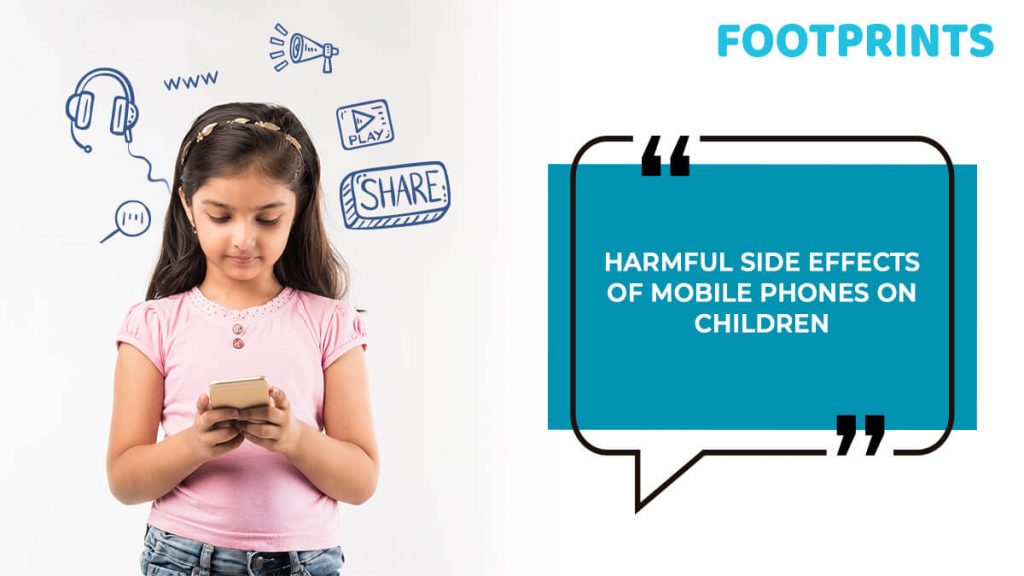
In today’s digital age, Mobile phones have become an integral part of our daily lives, providing us with convenience and connectivity like never before. From communication to entertainment, these devices have revolutionized the way we interact with the world. However, when it comes to children, the excessive use of mobile phones can harm their overall well-being. At Footprints, the preschool recognized as a beloved parenting partner, we prioritize the holistic development of children. In this article, we will delve into the harmful side effects of mobile phones on children, highlighting how they can negatively impact their health, development, and social interactions.
Eye strain and vision problems
One of the most significant concerns regarding children’s use of mobile phones is the strain it places on their eyes. Prolonged periods of staring at small screens can lead to eye fatigue and discomfort. The blue light emitted by these devices can also cause digital eyestrain, resulting in symptoms such as dry eyes, blurred vision, and even headaches. Furthermore, constant screen exposure can increase the risk of myopia or near-sightedness in children, potentially having long-term implications for their vision.

Sleep disturbances and insomnia
Another alarming effect of mobile phone usage in children is its impact on their sleep patterns. The blue light emitted by these devices can disrupt the production of melatonin, a hormone that regulates sleep. Constant exposure to screens before bedtime can interfere with the natural sleep-wake cycle, making it challenging for children to fall and stay asleep. This can lead to sleep disturbances, insomnia, and daytime drowsiness, ultimately affecting their mood, cognitive abilities, and overall well-being.
Increased risk of radiation exposure
Mobile phones emit radiofrequency (RF) radiation, which has raised concerns about potential health risks, particularly for children. The developing brains and bodies of children are more susceptible to the effects of radiation compared to adults. While the long-term effects are still under study, exercising caution and limiting children’s exposure to mobile phones is essential to minimize potential risks.
Negative impact on cognitive development
Excessive mobile phone use can negatively affect the cognitive development of children. Spending too much time on screens can restrict their exploration, creativity, and problem-solving opportunities. It also impedes their ability to engage in imaginative play, which is crucial for their brain development. Furthermore, constant multitasking on mobile phones can diminish their concentration, memory, and overall cognitive abilities.
Impaired social skills and communication abilities
Mobile phones have transformed how we communicate, but unfortunately, this transformation can adversely affect children’s social skills and communication abilities. Excessive mobile phone use can diminish the capacity to engage in face-to-face conversations, interpret non-verbal cues, and develop empathy. Children may become overly reliant on virtual interactions, leading to a decline in their social skills and ability to form meaningful relationships.

Poor academic performance and decreased focus
The distractions presented by mobile phones can substantially impact children’s academic performance. The constant stream of notifications, social media updates, and access to games can divert their attention from crucial tasks like studying and homework. This can result in reduced focus, diminished productivity, and, ultimately, a decline in academic performance. Parents and educators must monitor and manage children’s mobile phone usage to ensure they can effectively concentrate on their studies.
Increased risk of cyberbullying and online predators
The digital age has introduced new risks for children, and excessive mobile phone use can heighten their susceptibility to cyberbullying and online predators. Children may inadvertently share personal information or engage in risky online behavior while using mobile phones, rendering them vulnerable to malicious individuals. Parents must educate their children about online safety, establish clear guidelines, and monitor their online activities to safeguard them from potential harm.
Physical health issues and a sedentary lifestyle
The sedentary nature of mobile phone usage can contribute to various physical health issues in children. Excessive screen time leaves less room for physical activity, promoting a sedentary lifestyle that increases the risk of obesity, cardiovascular diseases, and musculoskeletal problems. Encouraging children to participate in outdoor activities, sports, and exercise can help counterbalance the negative impact of mobile phone usage on their physical health.
Tips To Reduce The Side Effects of Mobile Phone Use
While it is crucial to be aware of the harmful side effects of mobile phones use, it is equally important to provide children with guidance on mitigating these effects. Encourage children to limit their daily screen time, establish screen-free zones in the house, and prioritize face-to-face interactions. Teach them about responsible mobile phone usage, safe online behavior, and maintaining a healthy lifestyle. Children can enjoy the benefits of mobile technology by instilling these habits from an early age while minimizing its potential risks.
Conclusion
While mobile phones have undeniably revolutionized our lives, it is crucial to acknowledge and address the potentially harmful side effects that mobile phones can have on children. Footprints assist children in laying solid emotional foundations for success by fostering empathy, self-control, and social skills. Excessive mobile phone use can negatively impact a child’s development and well-being, from eye strain and sleep disturbances to cognitive impairments and deficits in social skills. Parents, educators, and society are responsible for promoting a healthy and balanced approach to mobile phone usage, ensuring that children are protected from the potential harms of excessive screen time.

Amita is an experienced educator with over 30 years of experience. She has an outstanding understanding of child development, having worked with various age groups for prestigious businesses. She has been dedicated to handling Footprints’s Curriculum and Delivery department for the past decade. Amita’s credentials include being one of India’s few HighScope Curriculum certified trainers and volunteering as a course leader for Landmark Education, the world’s largest training firm.


